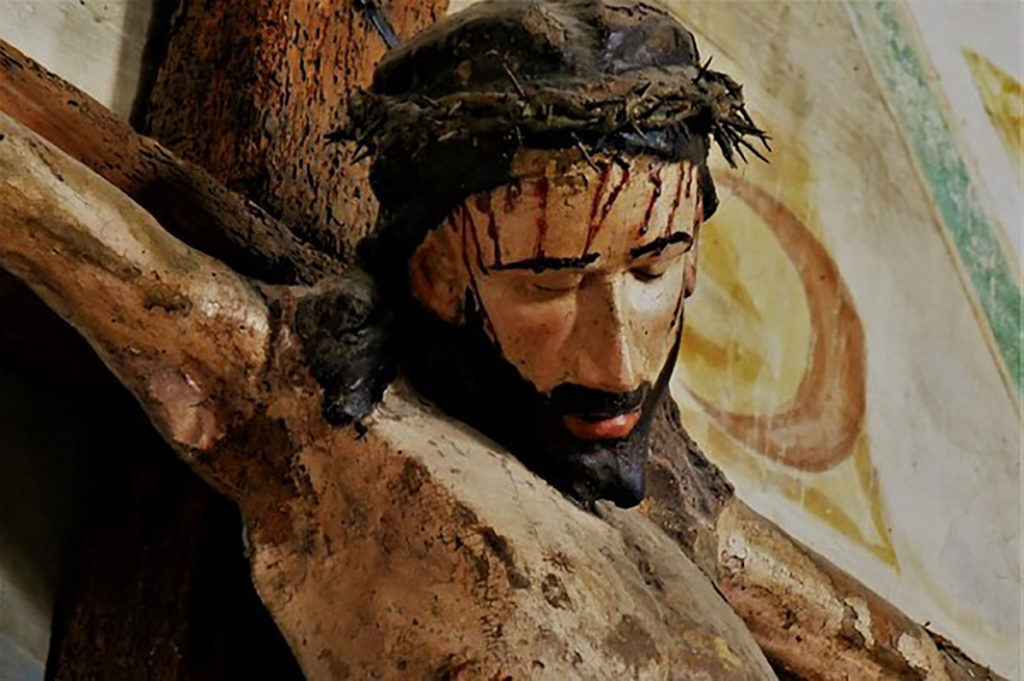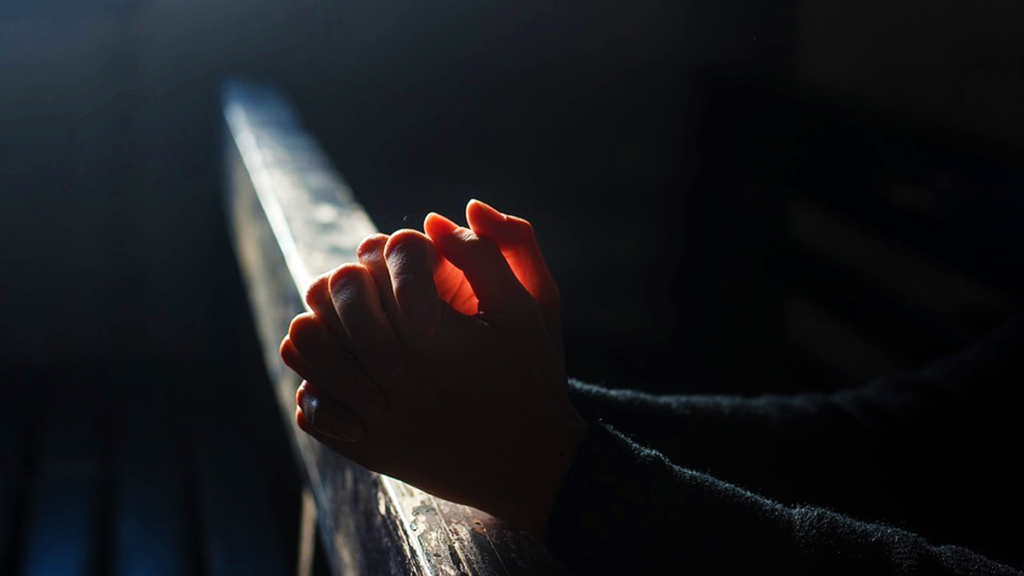The Third Sunday of Easter, Gospel Year A
“O LORD, I PRAY, SAVE MY LIFE”
Psalm 116:1-4, 12-19
Third Sunday of Easter
Analysis by Matthew DeLoera
1I love the LORD, because he has heard
my voice and my supplications.
2Because he inclined his ear to me,
therefore I will call on him as long as I live.
3The snares of death encompassed me;
the pangs of Sheol laid hold on me;
I suffered distress and anguish.
4Then I called on the name of the LORD:
“O LORD, I pray, save my life!”
12What shall I return to the LORD
for all his bounty to me?
13I will lift up the cup of salvation
and call on the name of the LORD,
14I will pay my vows to the LORD
in the presence of all his people.
15Precious in the sight of the LORD
is the death of his faithful ones.
16O LORD, I am your servant;
I am your servant, the child of your serving girl.
You have loosed my bonds.
17I will offer to you a thanksgiving sacrifice
and call on the name of the LORD.
18I will pay my vows to the LORD
in the presence of all his people,
19in the courts of the house of the LORD,
in your midst, O Jerusalem.
Praise the LORD!
DIAGNOSIS: The Contagion of a Virus
Step 1: Initial Diagnosis (External Problem): The Snares of Death
“The snares of death” (v. 3) encompass us. “The pangs of Sheol” (v. 3) are laying hold of us at this very moment—in the year of our Lord, 2020—with the exponentially-increasing death toll of our unfolding pandemic. Millions of infected bodies worldwide give testament to the unfathomable contagiousness of this utterly novel virus. Despite the constant and tireless work of medical teams and scientists to understand this virus, our knowledge remains limited. Defying everything that science tells us about risk factors, the virus stubbornly resists our best efforts to unlock the golden thread as to why some folks explicably die, while others suffer “minor” symptoms. “Then two will be in the field; one will be taken and one will be left” (Matt. 24:40).
Even if political agendas were not in play, we should not be surprised that our governments and authorities issue conflicting and constantly-shifting advisories on physical distancing, face masks, and personal hygiene. Insidiously, the virus remains asymptomatic but most contagious within the first days of infection. With rationing of tests and not knowing whether we carry contagion in our bodies, we isolate in our homes and witness silence and deserted streets across small towns and large cities. This is yet another death—a civic death.
Step 2: Advanced Diagnosis (Internal Problem): Who Can We Trust?
Without dependable answers or consistent leadership, we are confused and fear for our lives. The bare shelves of our supermarkets are due as much to widespread hoarding as to supply chain delays. This reality demonstrates how our lives have become so bound up in complex systems. Who could honestly prepare for circumstances like these? Regardless, we lament our lack of foresight, our failure to plan when we’re sure we could have; we’ve worked so hard to be responsible. We suffer “distress and anguish.” Or we are incredulous at those who defy stay-at-home orders or who refuse to wear face masks, convinced that they believe with equal consternation that, “Everyone is a liar” (116:11).
Step 3: Final Diagnosis (Eternal Problem): Encroaching Mortality
With nowhere else to turn, in our desperation we “call on the name of the Lord” (v. 4), “O LORD, I pray, save my life!” But how much suffering has finally pushed us into this unfamiliar piety? The psalmist testifies, “The LORD protects the simple; when I was brought low, he saved me” (v. 6). But, while we once were simple, now we are only low. Our prayer remains fervent, yet we despair as the daily reports from the CDC reveal an encroaching mortality, and the probability that tomorrow will only bring more. Somehow, our prayers do not bring the peace we crave. Perhaps we wonder whether God is even listening. Granted, we have the cold comfort of statistics to suggest we will likely not meet our inevitable mortality this way. Nevertheless, we have the undeniable sense that death is unavoidable.
PROGNOSIS: The Transmission of Hope
Step 4: Initial Prognosis (Eternal Solution): Resurrection beyond Comprehension
 Indeed, something, or rather Someone, dies. Jesus goes to the cross to die, taking the weight of our deepest despair and fear into his own body. He fervently prays that the cup might pass him by (Matt. 26:39). From the cross, in agony and despair he cries out, “My God, why have you forsaken me?” (Matt. 27:46). Surely, he knows that God’s angels would bear him up with but a word (Matt. 4:6). Yet, in defiance of all our logic and reason he dies our death, so that he might raise us to new life with him in the glory of a resurrection that is beyond our comprehension. And in this glory, he comes to give his promised forgiveness, so that we know that our heavenly Father has never forsaken us—even for a moment.
Indeed, something, or rather Someone, dies. Jesus goes to the cross to die, taking the weight of our deepest despair and fear into his own body. He fervently prays that the cup might pass him by (Matt. 26:39). From the cross, in agony and despair he cries out, “My God, why have you forsaken me?” (Matt. 27:46). Surely, he knows that God’s angels would bear him up with but a word (Matt. 4:6). Yet, in defiance of all our logic and reason he dies our death, so that he might raise us to new life with him in the glory of a resurrection that is beyond our comprehension. And in this glory, he comes to give his promised forgiveness, so that we know that our heavenly Father has never forsaken us—even for a moment.
Step 5: Advanced Prognosis (Internal Solution): The One Who We Trust
Jesus consistently gives us the only meaningful assurance, granting us his Spirit and filling us with a hope that will not be deterred. This word is not merely meant to placate, but is real power—power to face our daily situation without being consumed. Yes, many of us remain isolated in our homes. Yes, we remain blocked from physically gathering for worship. We do not know how long this will continue, quite possibly for months. We are groping our way through uncharted territory, not knowing whether some little unconscious or unexpected action might open a microscopic vector for calamity. And yet, this powerful hope will not let the powers of darkness overwhelm us. Sure, distressing news reports may persist, but we will stubbornly cling to the conviction that neither these, nor even the damned virus itself, will have the last word for us. “I will lift up the cup of salvation and call on the name of the LORD” (v. 13).
Step 6: Final Prognosis (External Solution): The Loosening of Our Bonds
Instead, in hope, we listen for the stories of countless medical folks working tirelessly to tend the sick, and scientists toiling day and night on vaccines and therapeutics that will preserve life for countless patients. Thousands of workers in diverse vocations give everything for the sake of neighbors and strangers; so we pay our “vows to the LORD in the presence of all his people” (v. 14). Some of these folks may even give their lives, and we lament for them: “Precious in the sight of the LORD is the death of his faithful ones” (v. 15). But none of this is in vain, for how much has been learned, and how much more will come, both good and bad.
Meanwhile, we turn our attention to countless others who remain isolated, so that our hope might become their hope, more contagious than any virus. The technologies we once scorned have become something of a lifeline for our communities, and perhaps even a means of grace in their own right. True, a lot of fractious debate revolves around this latter point (“virtual communion” anyone?). But perhaps we can take a welcome reprieve from such bickering, “loosening our bonds” (v. 16), and remind ourselves that there is something and Someone far greater at work in the midst of this. Thanks be to God.
